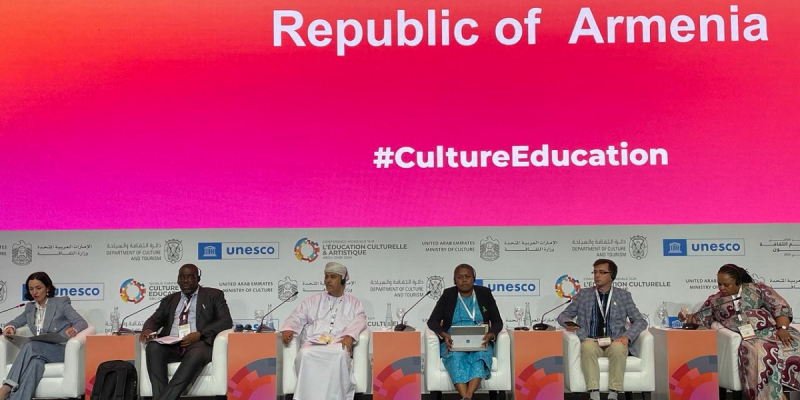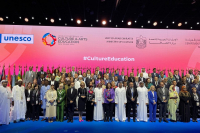RA Minister of Education, Science, Culture and Sports Zhanna Andreasyan participated in the UNESCO World Conference on Culture and Arts Education in Abu Dhabi, within the framework of which she delivered a report at the thematic panel session on “Quality and Relevant Lifelong and Life-Wide Learning in and through Cultural Diversity”.
During the report, the Minister highlighted the significance of lifelong learning within cultural diversity and addressed Armenia's experience. She observed that in 2022, the “RA Education Development State Program until 2030” was approved, one of the objectives of which is to establish an efficient and globally competitive educational system grounded in both national and universal values, aimed at the development of the Republic of Armenia, providing individuals at all stages of life the opportunity to receive high-quality education corresponding to their needs and capabilities.
The Minister noted that several strategic paths have been established to implement the program’s objective, one of which is creating a universally inclusive learner-centered and participatory educational environment. According to the Minister, this will enable every citizen, regardless of age, to access high-quality and efficient educational services deriving from his development and personal traits and fostering civic engagement throughout the Republic of Armenia.
Zhanna Andreasyan also noted that lifelong learning cannot be considered outside the concept of cultural diversity. In recent years, the Republic of Armenia has implemented initiatives to promote the growth of modern art, with a focus on fostering cultural diversity and integrating formal and informal cultural education.
At the UNESCO World Conference on Culture and Arts Education, ESCS Minister Zhanna Andreasyan also touched upon the realization of the right to education in the context of ethnic cleansing and forced displacement of the civilian population of Nagorno-Karabakh. She noted that the Ministry has made and continues to make every effort to ensure the full integration of the internally displaced population from Nagorno-Karabakh into the educational process.
The Minister highlighted the importance of the international community's response to ensuring the protection of the cultural and educational rights of forcibly displaced people from Nagorno-Karabakh and thanked for sending a UNESCO fact-finding mission to Armenia to assess the educational needs of those individuals.
Note that following the results of the Conference, the document “Framework for Culture and Arts Education” will be adopted, aimed at proposing new avenues to improve, deepen and scale up collaboration between education and culture while harnessing digital technologies to accelerate the achievement of present and future global development objectives set by the 2030 Agenda for Sustainable Development.
While on a visit, the ESCS Minister also held bilateral meetings.






